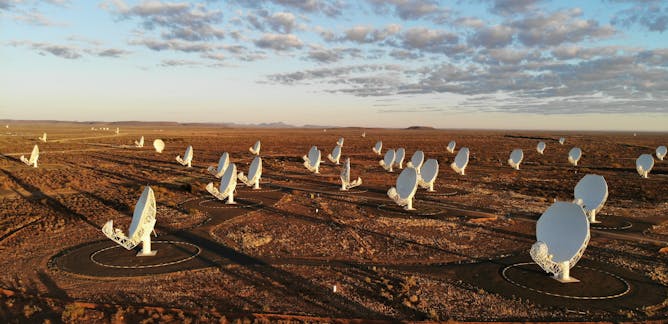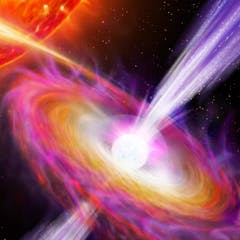
Articles on Universe
Displaying 1 - 20 of 140 articles

MeerKAT has made remarkable contributions to South African and international science.

Powerful jets are launched from the most massive objects in our universe, but we don’t fully understand how. This measurement gets us a step closer to solving the mystery.

The nature of dark energy remains one of the biggest puzzles in cosmology.

People have been looking up at the stars for thousands of years. Here’s where to start if you want to learn more about the night sky – from spotting easy-to-find constellations to using the best apps.

Do all big black holes in very massive galaxies emit radio waves? We used the latest radio telescopes to find out.

If we lived in a cosmic area with below average density, it would explain recent contradictory measurements of the universe’s expansion.

The universe is expanding faster than physicists would expect. To figure out what processes underlie this fast expansion rate, some researchers are first trying to rule out what processes can’t.

In September 2023, a NASA mission successfully brought samples of an asteroid down to Earth in a sealed capsule. Analysis of these samples may reveal information about the origins of the universe.

Viral headlines would have you think Saturn’s rings will vanish in just 18 months. Here’s what that really means and why you don’t need to worry.

The universe appears to be fine-tuned for life to evolve.

If the average amount of information conveyed by an event is always decreasing, it could mean we live in a computer program.

An astronomer explains why space looks so dark despite containing 200 billion trillion stars.

Planetary analogues are sites on Earth that are so extreme that they replicate those of celestial bodies in our solar system.

An astronomer and ‘black hole historian’ explains how the parts of the universe black holes grow in might influence how quickly they become bright, supermassive objects.

A new hypothesis suggests that the universe may be twice as old as we had believed. Observations from the James Webb Space Telescope provide new information on the rate of the universe’s expansion.

Black holes are known for pulling in all kinds of stuff – including light. Here’s how that actually works.

To find out what is beyond space, a good place to start would be to figure out where space – our universe – ends.

The darkness of the night sky seems so obvious as to need no explanation – yet it has intrigued and baffled scientists for centuries.

Our Sun will likely go out quietly – but not all such stars do. A new radio detection of a supernova can help us better understand these cosmic cataclysms.

Different measures of the rate of the Universe’s expansion give different results – and a new measurement technique only makes matters more complicated.
